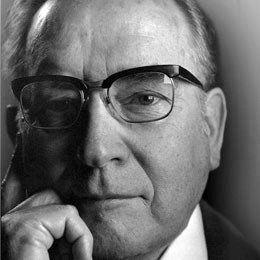Karl Keller, poet, professor, and critic, once called Clinton F. Larson “the first Mormon poet” (ref). Rather, that’s what the editor of Dialogue says Keller argues in his review of Larson’s The Lord of Experience (see the reference link at the end of my first sentence). To be exact, though: Keller opens his review with this claim: “I think that at some far-distant point in time the history of Mormon poetry may well have to be said to have begun with Clinton F. Larson and this first collection of his verse.” Later in the paragraph, Keller says this isn’t so much because Larson’s poetry is “good” as much as because it’s “real,” something Keller suggests he hadn’t seen before The Lord of Experience was published. He clarifies what he means by that when he says Larson’s book “does not show art filling a religious purpose” as so much early LDS poetry does (including that written by Zion’s Poetess, Eliza R. Snow), but, Keller continues, it “shows (at last, after all the history of pursuing The Word in the Church) religion succeeding in an esthetic way.” In this view, Larson’s poetry, as with a fair bit of the poetry written by Mormons over the last half-century, doesn’t attempt to defend or to spread or to sentimentalize Mormonism’s message via the vessel of meter and rhyme. Rather, it attempts to show what influence Mormonism can have on a person’s imagination and language and to use that influence to effect readers.
Larson comments on this attempt in the answers he gave to questions posed in a group interview published in the August 1975 New Era, an LDS youth magazine. Larson’s responses say a lot, I think, about his philosophy of poetry. In this post, I’ll try (briefly) to unpack his response to the interviewer’s first question: “What are you trying to achieve with your poetry?” Larson’s answer: “I am trying to achieve valid and beautiful excursions into experience. A poet not only has the obligation to express himself, but to think and feel himself into another person’s position. A poet should never stop making excursions into experience.”
A few words/ideas stick out to me:
1) Valid because it points to poetry (as compressed language) being grounded in and justified by the varieties of human experience. If something is invalid (as an argument, statement, or theory) it’s untrue because it’s based on erroneous information or unsound reasoning. It follows, then, that valid excursions into human experience, as a poet ought to represent them (at least in Larson’s view), should be based on pure knowledge and sound reasoning about humans’ place in the world and in the universe.
2) Beautiful because to be enjoyed literary excursions into experience should be beautiful, a state of being that often inspires awe, which emotion can influence the way readers see themselves, the way they see others, and the way they see the world.
3) A poet has the obligation to think and feel him/herself into another person’s position. As someone whose imagination and language have been heavily influenced by the valid and beautiful aspects of existence, a poet is responsible to use her/his expanded capacity to imagine and to communicate (to commune) with words as a means to enter others’ experience and, further, to invite readers into that experience. This sounds very Keatsian, very negative capability-ish in that Larson suggests that the poet should be open-minded about the varieties of life on earth and of human experience, that s/he shouldn’t be averse to delving into the multiplicity of other people’s/creature’s perceptions. This negative capability also suggests that the poet shouldn’t try to resolve the “uncertainties, mysteries, and doubts” arising from such engagement with the Other but that, instead, they should expand the ability to hold within their minds, language, and experience the ambiguities inherent in human reality to the end of developing into a deeper understanding of the nature and promise of existence.
There seem to be strains of both Mormonism and Romanticism flowing through through this philosophy. Romanticism in the sense that it assumes that a poem should be beautiful enough to evoke readers’ awe and in the process expand their capacity to experience the world and others’ presence in it. And Mormonism in that it assumes that a poet is responsible to wield her/his power and influence via the persuasive capacities of well-crafted narratives, a soul filled with charity and empathy, and thoughts embellished with the virtues of beauty (see especially D&C 121:41-42, 45).
I’ve touched on some of these ideas in a previous post, but I hope in future posts to comment on Larson’s other responses in light of specific poems and to address in the same depth what the other poets in the New Era interview have said, too. But for now: what think ye?

